How to Choose the Right Screw-Type Window Opener?
A screw-type window opener, as a key type of electric window opener, is highly favored in specific applications due to its unique linear push-pull motion and powerful thrust. It works by converting the rotational motion of an internal screw into linear motion to open and close a window. So, how do you choose the right screw-type window opener? This article will provide a detailed breakdown.
1. Advantages and Suitable Scenarios
Before choosing, you should first understand the characteristics of a screw-type window opener to determine if it's the right fit for your needs:
High Thrust and Stability: The internal structure of a screw-type door/window opener allows it to provide significant thrust, easily handling heavy windows, skylights, or louvers. It also operates with great stability, minimizing shaking.
Long Stroke and Flexible Adjustment: The screw's extension stroke can be customized to meet the opening angle requirements of different windows.
Compact Structure and Clean Appearance: Screw-type openers typically have a cylindrical shape, which looks neat and compact after installation.
Therefore, screw-type window openers are particularly suitable for heavy or special windows that require high thrust, a long stroke, and a clean appearance, such as large skylights, roof windows, large smoke vents, or louvers.
2. Key Parameters: Thrust, Stroke, and Speed
When choosing a screw-type window opener, you need to focus on three key parameters:
Thrust (N): This is the most crucial parameter. The thrust of a screw-type opener can range from a few hundred Newtons (N) to over a thousand. You should select a model based on the actual weight and opening resistance of the window. In general, the thrust should be greater than the combined weight and opening resistance of the window, with some buffer to ensure long-term, stable motor operation.
Stroke (mm): This refers to the maximum length the screw can extend. The stroke determines the maximum angle or distance the window can open. You need to ensure the opener's stroke meets your window's opening requirements. If the stroke is too short, the window won't be able to open fully; if it's too long, it might be wasteful or difficult to install.
Speed (mm/s): This is the speed at which the screw extends. The faster the speed, the less time it takes for the window to open or close. For smoke vents that require a quick response, you should choose a model with a faster speed. For regular windows, you can choose based on personal preference.
3. Power and Control Methods
Like most electric window openers, screw-type window actuators are available with different power and control options:
Power: Typically, there are two options: DC 24V and AC 220V.
DC 24V: This is safer and better suited for fire linkage and smart home systems. In the event of a fire, a DC 24V system can quickly activate through a fire module.
AC 220V: This uses a direct mains connection, making installation simpler, but it requires more attention to electrical safety.
Control Methods:
Manual Switch: The simplest control method, operated by a wall switch or remote control.
Smart Control: Allows for remote and scheduled operation via a mobile app, voice assistant, or smart panel. If you plan to integrate it into a smart home ecosystem, check if the window actuator supports the necessary communication protocols (e.g., Wi-Fi, Zigbee, Bluetooth).
4. Brand, Quality, and After-Sales Service
A screw-type window actuator is a precision electromechanical product, and its quality and durability are critical.
Choose a Reputable Brand: Major brands offer better assurance in product design, materials, and quality control. DIHOOL offers multiple models of electric window openers to cater to diverse customer requirements. Such as DHLA35 Pen-Type Linear Actuator, DHLA36 Pen-Type Electric Actuator, DHLA45 Straight Linear Actuator.
Check the IP Rating: For openers installed in damp environments (like bathrooms, kitchens) or outdoors, choose a product with a high IP rating (e.g., IP55 or higher) for protection against moisture and dust.
Understand the Warranty and After-Sales Service: Ask about the product's warranty period and after-sales service policy to ensure you can get timely support and repairs if issues arise.
In conclusion, choosing the right screw-type window opener requires a comprehensive evaluation of the window type, key parameters (thrust, stroke, speed), power and control methods, and brand quality. By understanding your needs, you can find the perfect product.





